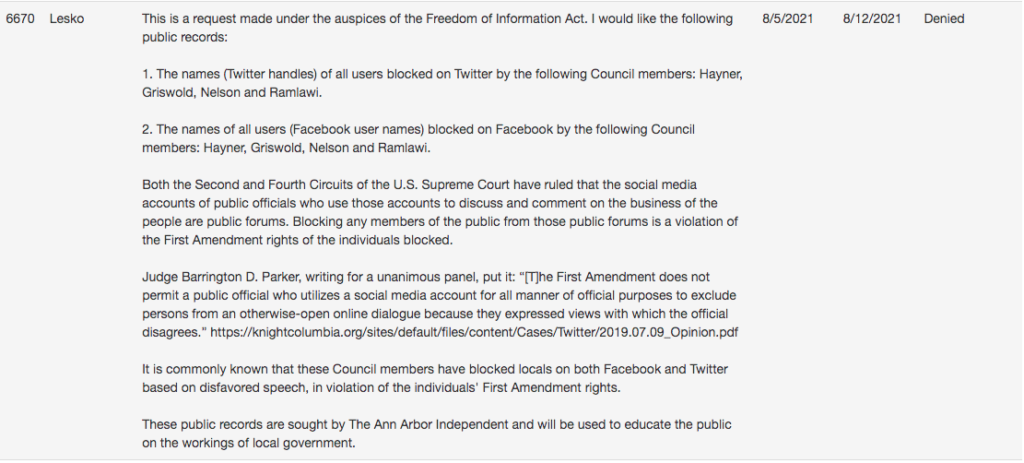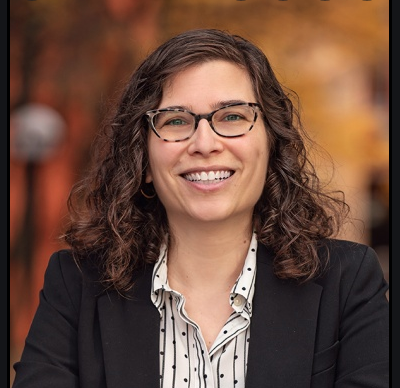Social Media Blocks By Local Elected Officials Trample on Residents’ First Amendment Rights
by P.D. Lesko
Note: If you are blocked on social media by any elected official, this may be a violation of your First Amendment rights. The Knight First Amendment Institute at Columbia University successfully sued President Donald Trump, and the U.S. Second Circuit upheld the ruling in Knight First Amendment Institute v. Trump. The judges of the Second Circuit ruled unanimously that elected officials who use their social media accounts as public fora, and to conduct the business of the public (as opposed to purely personal accounts), may not practice viewpoint discrimination.
Note: Council member Briggs contacted the A2Indy via email on Oct. 22 and said: “I apologize for missing this message [about a social media block] in August. It was unfortunately sent when I was on vacation in the UP and I apparently missed it. This week was the first time this issue was in my radar.”
President Donald Trump, angered by Twitter followers whose views differed from his, blocked those followers from viewing his Twitter account, where he discussed policy, politics, his work as President, and interacted with those whose views he found agreeable. In 2020, in response to Knight First Amendment Institute v. Trump, a federal court ruled that Trump was not entitled to block his followers. The U.S. Second Circuit upheld the lower court’s ruling and issued an opinion that found blocking individual respondents on the basis of their viewpoints violates the U.S. Constitution’s First Amendment. Because it was a public forum of sorts, and because the President’s social media account often included discussions of official matters, and published contributions from White House staff members, the President was not allowed to retaliate by blocking followers’ Twitter accounts. In Ann Arbor, a number of local elected officials, like Donald Trump, and despite the 2020 ruling of the U.S. Second Circuit, have openly practiced viewpoint discrimination. These elected officials blocked people from their social media accounts, which the officials use to discuss public policy and official matters. The elected officials include several City Council members, as well as Trustees of the Ann Arbor District Library.
In 2017, non-profit, non-partisan news outlet ProPublica filed requests for the social media block lists for every U.S. governor and 22 federal agencies. The records were turned over, and as a result, ProPublica discovered that: “nearly 1,300 accounts were blocked — more than half by Kentucky Gov. Matt Bevin. Bevin’s a Republican, but both Democrat and Republican governors block people.” When the administrator of a public Facebook page or Twitter account blocks an account, the blocked user can no longer comment. That can lead to an inaccurate public image of support for government officials, their opinions and their policies. This is precisely what elected (and appointed) officials in Ann Arbor have been doing, muzzling individuals on social media who have viewpoints that differ from their own.
ProPublica authors Derek Kravitz, Terry Parris Jr. and Leora Smith asked in their 2017 article, “If a city council member, mayor, state representative or governor is blocking or curating their constituents on Facebook and Twitter, that’s important for local reporters to know. Who are these elected officials blocking? Why? And how many?”
To answer this question, on August 5, 2021, The Ann Arbor Independent submitted a Freedom of Information Act request for the social media block lists of all City Council members. Though social media block lists of elected officials who use their accounts as public fora are subject to public records requests, the request (below) was denied on August 12 with the explanation that the requested records were not subject to FOIA. The response, in essence, signaled the existence of the records sought.

The newspaper then put out a call on social media to individuals whose social media accounts were blocked by any local elected official.

Rather than appeal the August FOIA denial in District Court, with evidence of viewpoint discrimination practiced by local elected officials, The Ann Arbor Independent contacted the Knight First Amendment Institute at Columbia University to sue Ann Arbor Council member Erica Briggs (D-Ward 5). Briggs had blocked the newspaper, as well as other individuals on Twitter. According to screenshots shared by multiple individuals, other Council members who have engaged in viewpoint discrimination, and have violated the civil rights of constituents, residents and voters include Jeff Hayner (D-Ward 1), Linh Song (D-Ward 2), Travis Radina (D-Ward 3), Jen Eyer Irwin (D-Ward 4), Elizabeth Nelson (D-Ward 4) and Erica Briggs (D-Ward 5).
Members of the Ann Arbor District Library Board of Trustees who indulged in viewpoint discrimination and violated the civil rights of their constituents included Scott Trudeau, Dr. Molly Kleinman and Dharma Akmon. Trudeau, as a former mayoral appointee to the Ann Arbor Planning Commission, blocked residents based on viewpoint discrimination from his social media accounts, where he discussed the business of the Planning Commission and solicited feedback from residents. He continued to do so after being elected to the AADL Board of Directors. Kleinman, a current mayoral appointee to the Ann Arbor Transportation Commission, blocked residents based on viewpoint discrimination from her Twitter account, where she discusses the business of the Transportation Commission and solicits feedback on city transit policies. Like Trudeau, she continued to do so after being elected to the AADL Board of Directors.

Scott Trudeau. Photo | Twitter ![]()
Dr. Molly Kleinman. Photo | The Ford School 
Dharma Akmon. Photo | Twitter
The A2Indy contacted the AADL Board, and informed the body that the newspaper had engaged the Knight First Amendment Institute to sue Council member Eric Briggs for practicing viewpoint discrimination. The newspaper pointed out that members of the AADL Board were also practicing viewpoint discrimination. Shortly thereafter, the three trustees unblocked local residents on social media.
On October 19, A2Indy sent an email to all of the City Council members above informing them about the letter sent to Council member Briggs from the Knight First Amendment Institute and asking if they were continuing to block residents on social media. Council members Hayner, Radina, Nelson and Briggs responded.
One Council member admitted to viewpoint discrimination and said the practice would continue: “Before I started blocking, my page was filled with abusive content posted by a handful of well-known residents, elected officials, and their paid operatives, and I spent countless hours monitoring it….It’s absurd to think that somehow people are prevented from seeing what I am saying, as there are people who constantly monitor and re-post items from my page on other pages, I don’t think I need to expand on the obviousness of this. It’s equally absurd to think that someone I have blocked cannot contact me or share their opinion with me as I have both a public email address for city business, and a public phone number for city business, both of which are posted on my page. I don’t view blocking as discrimination, only self-preservation.”
Council members in their emailed replies admitted to blocking “fake names,” or trying to discern who was “real” on social media in order to determine who should be blocked. As elected officials, they are not permitted to block people on social media who use handles where the user chooses to be anonymous. On the contrary, people who use pseudonyms on social media have the same civil rights and protections from viewpoint discrimination as individuals who choose to use their “real” names.
Another Council member wrote, “For whatever it is worth, I can offer: I have blocked one (and only one) person on social media. I blocked Joe Spaulding because he admitted early and often that he was not a resident of our community, I felt no obligation to make myself available to him for abuse.”
An individual’s First Amendment rights don’t stop at city, county or state lines.
After receiving an October 19, 2021 letter from the Knight First Amendment Institute informing her that she was practicing viewpoint discrimination, Council member Briggs contacted The Ann Arbor Independent. She wrote, “I didn’t realize A2Indy was blocked on my Twitter Account. I have unblocked you.” In August 2021, at the recommendation of the Knight First Amendment Institute lawyers, Briggs was sent an email to her a2.gov email address asking why she had the A2Indy blocked on Twitter. The Council member never responded.





Comments are closed, but trackbacks and pingbacks are open.